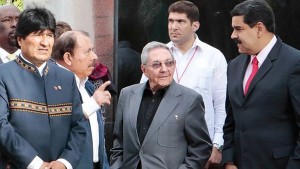Carlos Sánchez Berzaín
June 14, 2018
 (Interamerican Institute for Democracy) The Organization of American States’ (OAS) 48thPeriod of Ordinary Sessions has fulfilled the organization’s objective of “promoting and consolidating democracy” declaring Venezuela’s electoral process and regime as illegitimate. It is a historical event that consolidates the OAS’ recovery, following a shameful period in which it was under the control of, and was an instrument for, “the 21stCentury Socialism” today known as “Organized Crime’s Dictatorships”. This is a reminder that there are still “two Americas”, the one democratic and the other dictatorial comprised by four dictatorships; Cuba, Venezuela, Nicaragua, and Bolivia.
(Interamerican Institute for Democracy) The Organization of American States’ (OAS) 48thPeriod of Ordinary Sessions has fulfilled the organization’s objective of “promoting and consolidating democracy” declaring Venezuela’s electoral process and regime as illegitimate. It is a historical event that consolidates the OAS’ recovery, following a shameful period in which it was under the control of, and was an instrument for, “the 21stCentury Socialism” today known as “Organized Crime’s Dictatorships”. This is a reminder that there are still “two Americas”, the one democratic and the other dictatorial comprised by four dictatorships; Cuba, Venezuela, Nicaragua, and Bolivia.
In the Americas, democracy is obligatory for those governments that are part of the OAS. It is neither an abstract concept relegated to theorist considerations, nor is it a debatable question because it is contained in a mandatory text that is the Interamerican Democratic Charter (IDC) subscribed in Lima on the 11thof September of 2001. The term “Charter” in International Law “is used to designate official instruments of grave solemnity and significance, such as the organizational charter of an international organization”. The OAS has two charters; the Charter of Bogota which birthed the organization and the Interamerican Democratic Charter, with which democracy was institutionalized. That is the importance and indispensability of a mandatory standard that dictatorships pretend to dismiss as a simple proclamation.
Article 1 of the IDC mandates that “America’s people have the right to democracy and their governments have the obligation to promote and defend it”. Article 3 declares that “representative democracy’s essential components are, among others; respect for human rights and basic freedoms, access to power and its discharge subject to the Rule of Law, the conduct of periodic, free, fair elections based on the universal and secret suffrage as an expression of the people’s sovereignty, the plurality of political parties and organizations, and the separation and independence of the branches of government”.
A dictatorship is “the political regime that, through force or violence, concentrates all power in one person or in one group or organization and represses human rights and individual basic freedoms”. Applying the concept of the IDC, there is a dictatorship when “a kind of government that concentrates power in one individual or an elite, violating any of the essential components of democracy” is established. These are the features that we now see in Cuba, Venezuela, Nicaragua, and Bolivia that are dictatorships.
Democracy is finally reacting, following almost two decades of imposition by the Cuban dictatorial mold with Venezuela’s oil resources from the Castro-Chavez alliance, followed by the Castroist’s control of Nicolas Maduro’s regime. This made the OAS, with Insulza as its General Secretary, an instrument for the expansion and cover up of dictatorships that were strengthened by an unraveled Transnational Organized Crime’s scheme known as “Lava Jato” with “the Forum of Sao Paolo” that involved bribes and payoffs for the contracting of mega construction projects with the participation of Lula da Silva from Brazil and that are still covered up in Cuba, Venezuela, Nicaragua, and Bolivia.
The OAS’ current General Secretary, Luis Almagro, broke the scheme in the case of Venezuela, applying the IDC with his reports and his sustained fight that created the “Almagro Doctrine”. The new U.S. foreign policy set by President Trump in June of 2017 has began to be applied -almost a year thereafter- with efforts by Secretary of State Mike Pompeo and signals the return to the principles that coincide with his national security’s interests. The Group from Lima, Mexico’s leadership, the courage of Costa Rica and Chile, Argentina and Brazil’s decision, the change in Colombia, have released 19 important votes, but are not enough.
Among the 11 countries that abstained, Ecuador stands out with indications of its departure from the group of dictatorships that was formerly tied to by Correa. Nicaragua, one of the dictatorships that abstained, surely did so in exchange for the lenient treatment it received, and there are still those countries that are still dependent on the dictatorial oil or fear. Those supporting the Venezuelan dictatorship are; Cuba who showed that it controls -from the outside- the island nations of Dominica and Saint Vincent, LG, and Evo Morales’ Bolivia whose illegitimate tenure in power depends of Venezuela and Cuba’s dictatorships.
We cannot afford to forget there are four dictatorships; Cuba, Venezuela, Nicaragua, and Bolivia who comprise a Transnational Organized Crime’s group.
Translated from Spanish by Edgar L. Terrazas, member of the American Translators’ Association, ATA # 234680.
Published in Spanish by Infobae.com on Sunday June 10th, 2018
 Carlos Sanchez Berzain Abogado | Estadista | Político | Politólogo
Carlos Sanchez Berzain Abogado | Estadista | Político | Politólogo